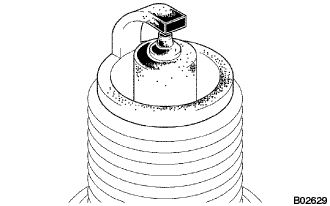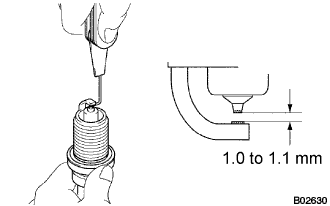Ignition System -- On-Vehicle Inspection |
- NOTICE:
- In this section, the terms "cold" and "hot" refer to the temperature of the coils. "Cold" means approximately -10 to 50°C (14 to 122°F). "Hot" means approximately 50 to 100°C (122 to 212°F).
| 1. PERFORM SPARK TEST |
Check for DTCs.
- NOTICE:
- If a DTC is present, perform troubleshooting procedures for that DTC.
Check if sparks occur.
Remove the ignition coil.
Remove the spark plug.
Install the spark plug to the ignition coil and connect the ignition coil connector.
Disconnect the 8 injector connectors.
Ground the spark plug.
Visually check that sparks occur while the engine is being cranked.
- NOTICE:
- Be sure to ground the spark plugs when checking them.
- If the ignition coil has been struck or dropped, replace it.
- Do not crank the engine for more than 2 seconds.
Perform the Spark test according to the flowchart below.
Check that the wire harness side connector of the ignition coil with igniter is securely connected.
- Result:
Result Proceed to NG Connect securely OK Go to next step
Perform a spark test on each ignition coil with igniter.
- 1. Replace the ignition coil with igniter with a normal one.
- 2. Perform the spark test again.
- Result:
Result Proceed to OK Replace ignition coil with igniter NG Go to next step
- 1. Replace the ignition coil with igniter with a normal one.
Check the power supply to the ignition coil with igniter.
- 1. Turn the ignition switch on (IG).
- 2. Check that there is battery voltage at the ignition coil positive (+) terminal.
- Result:
Result Proceed to NG Check wiring between engine switch and ignition coil with igniter OK Go to next step
- 1. Turn the ignition switch on (IG).
Check resistance of camshaft position sensor.
- Standard resistance:
Temperature Specified Condition Cold 835 to 1,400 Ω Hot 1,060 to 1,645 Ω
- Result:
Result Proceed to NG Replace camshaft position sensor OK Go to next step
Check resistance of crankshaft position sensor.
- Standard resistance:
Temperature Specified Condition Cold 835 to 1,400Ω Hot 1,060 to 1,645Ω
- Result:
Result Proceed to NG Replace crankshaft position sensor. OK Go to next step
Check IGT signal from ECM.
- Result:
Result Proceed to NG Check ECM OK Repair wiring between ignition coil and ECM
Using a 16 mm plug wrench, install the spark plug.
- Torque:
- 18 N*m{183 kgf*cm, 13 ft.*lbf}
Install the ignition coil.
| 2. CHECK SPARK PLUG |
- NOTICE:
- Do not use a wire brush for cleaning.
- Do not attempt to adjust the electrode gap of a used spark plug.
Check the electrode.
Using a megohmmeter, measure the insulation resistance.
- Insulation resistance:
- 10 MΩ or more
- HINT:
- If a megohmmeter is not available, perform the following simple inspection instead.
 |
Alternative inspection method:
Quickly accelerate the engine to 4,000 rpm 5 times.
Remove the spark plug.
Visually check the spark plug.
If the electrode is dry, the spark plug is functioning properly. If the electrode is damp, proceed to the next step.
 |
Check the spark plug for any damage on its thread and insulator.
If there is damage, replace the spark plug. If not, reinstall the spark plug.- Recommended spark plug:
DENSO made SK20R11 NGK made IFR6A11
Check the spark plug electrode gap.
- Maximum electrode gap for used spark plug:
- 1.3 mm (0.051 in.)
- Electrode gap for new spark plug:
- 1.0 to 1.1 mm (0.039 to 0.043 in.)
- NOTICE:
- When adjusting the gap of a new spark plug, bend only the base of the ground electrode. Do not touch the tip. Never attempt to adjust the gap of a used plug.
 |